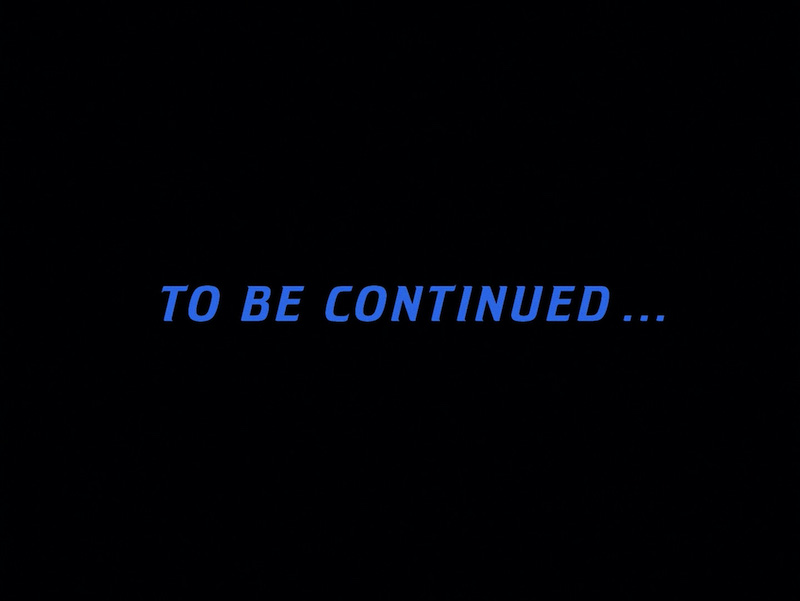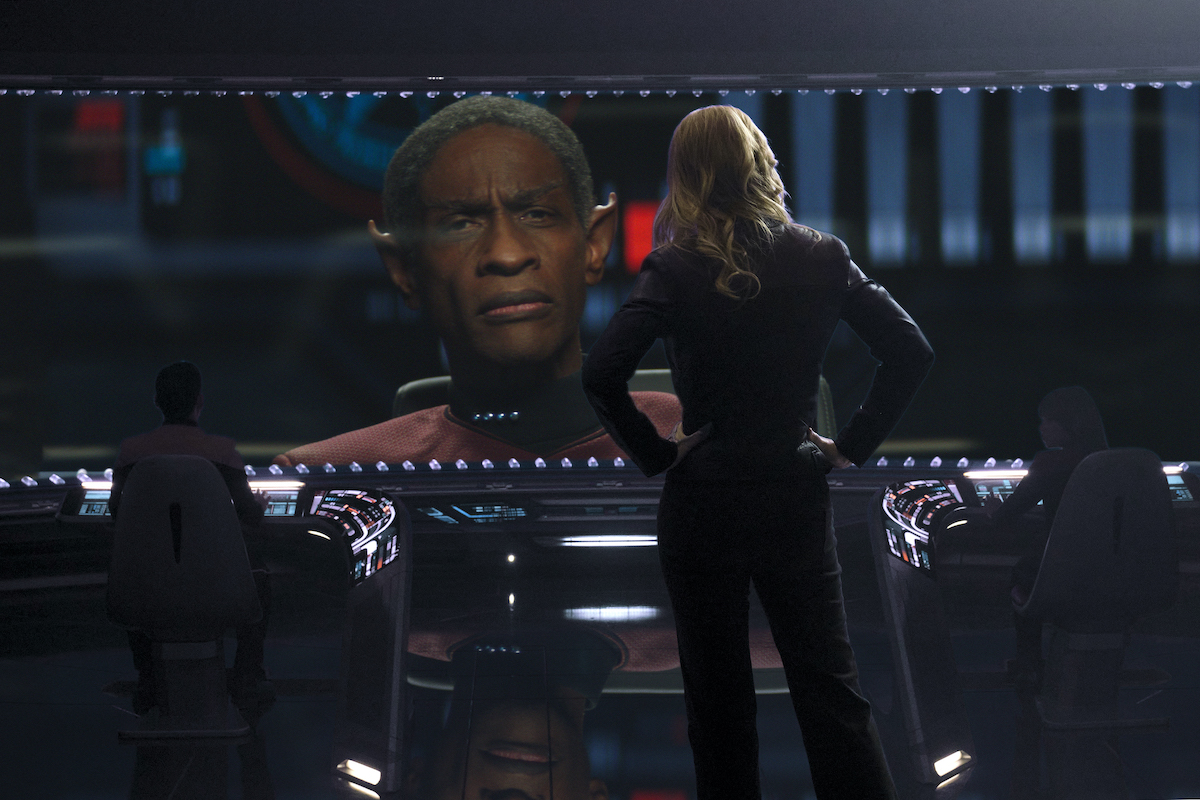This entry was written during the 2023 SAG-AFTRA strike. Without the labor of the actors currently on strike, this television series wouldn’t exist. To learn more, visit the SAG-AFTRA strike site.
“So… I’ve been weighing the morality of something.”
A funny thing happened on the way to writing last week’s recap: my web site crashed, quite badly, which was (I must admit) a thing I didn’t think still happened in 2023. And, not being the best at backing up my own infrastructure, I spent four or five days looking at a world where Blogging the Next Generation: Picard was going to die four entries shy of its end, with its prior 26 entries unrecoverable. It felt somewhat karmic, given what a mountain I had to climb over [cough season two cough] to get to a point where I actually like writing these. Which, by the way, I do: I really like writing these entries about season three. Pretty much every single one, I finish with a sense of satisfaction and good humour that wasn’t present in writing either previous year’s recaps. I don’t have any honest idea of whether the show is actually “good now” in season three; it is, however, consistent in a way it was not in either previous year; and it involves characters I have decades of bedrock-strong fondness for, which both pisses me off (nostalgia-baiting, in any franchise, is reductive and weak) and yet works marvelously, nevertheless. Nostalgia-baiting is profitable for a reason. There should be a Rule of Acquisition about it.
A good example opens this episode: Tuvok turns up. I’ve written in the past about how generally unsatisfying I found Voyager; and yet I’ve also written about how it’s part of the “family” of my Star Trek experience, by dint of when it was made, and by whom. I don’t love Seven and I never cared much for Tuvok and yet, as soon as the latter turns up here, a small part of me was thrilled, just as I dependably am every time one of the Picard composers trots out a quote of Jerry Goldsmith’s heart-swelling Voyager theme. Plus, Tim Russ rules — check out his cameo on Poker Face last season for a recent example — so catching sight of him in uniform again is grand, even if it turns out (almost immediately) not to be him. Remember that time Chief O’Brien strolled up to Sisko on Earth in “Homefront,” even though the Chief was certainly back on DS9 at the time? It’s like that: Changelings are everywhere. (But seriously: where’s the Chief??)
After this prologue, we get my favourite scene in the episode, which is likely because (once again) it brings up such warm, nostalgic feels: Beverly has a line on potentially tracking and killing these Changeling terrorists with a genetic virus, except whoops, that’s mayyyyybe a genocidal maneuvre and she wants everyone to weigh in before she proceeds. Look, I loved this stuff on Next Gen (the Sarjenka debate in “Pen Pals” is one of my favourite dialogue scenes in the whole series, and Dr. Crusher faced similar ethical quandaries weaponizing the Nanite civilization against the Borg in “The Best of Both Worlds”). Obviously, we’re decades past the point where moral dilemmae are considered appropriate dramatic substance to form the spine of a Star Trek episode. I miss those days, because so many of the all-time best TOS and TNG episodes came out of them; but even I will allow that once you’ve made “In the Pale Moonlight” on Deep Space Nine, you may have hit the conceptual finish line. Besides: ethics, decorum, principles… they feel so “20th Century,” compared to the nominal adventures of NuTrek’s leather jacket-wearing Starfleet rogues. (Everyone’s getting into the leather jackets on the Titan, now, btw. Those fucking leather jackets.)
In as much as the entire season is serialized, “Dominion” feels the closest to the setup for a two-parter, even though it doesn’t end with a classic TNG “to be continued…” card at the end. Vadic is lured onto, and ultimately overthrows, the Titan; Shaw gets the hell beaten out of him (for, like, the third time?); and Lore battles Data for the future of Data’s soul, now that they’re both locked in the same positronic body together. Once required to play Data/Lore scenes from opposite sides of locked-off splitscreens on Star Trek: The Next Generation, Brent Spiner is now called upon to go full Moon Knight, switching between alters in unbroken shots, as Lore and Data flick back and forth between consciousness.
Also lightly exhumed here is a peculiar after-effect of the Next Gen feature films, which chose to emphasize Picard and Data as principal characters and thereby ginned up (to my eye, at least) a closer-than-established friendship between the two men, at the expense of both characters’ close relationships with the other, less marquee-worthy members of the crew. Picard and Crusher? I don’t think they had a single scene together in any Next Gen film. And Data and La Forge, Next Gen‘s signature BFFs? Nearly the same. Data sacrifices his life in Nemesis to save Picard; Geordi’s the one who drops the force field to send his friend to his death, and LeVar Burton plays the hell out of that wordless beat, which is about all he can do.
Season one of Picard, twenty years later, was absolutely obsessed with Picard’s friendship with Data; but I’d argue it’s Geordi’s relationship with Data that we, the Next Gen audience, care about more. The Picard/Data plotline, in which Picard ultimately gave Data’s consciousness a death, has been clumsily backpedalled now (which this episode at least has the grace to acknowledge), but as Picard muses about the grinding gears of his years-long efforts to let Data go, it feels as though Geordi’s more resonant feelings for his best friend are fighting for air. “Dominion” at least attempts to give Geordi and Data a short story together, as Lore locks himself behind glass doors and taunts Data’s best friend with the knowledge that Lore is keeping Data from revealing. (Whew.) But Geordi’s tearful description, in one speech, of what losing Data meant to him can’t compete with Picard having focused an entire season on the same grief from a different man.
Meanwhile, Jack is manifesting new powers almost faster than the scripts can come up with reasons for him to use them. He’s telepathic now (he immediately uses it to hit on Sidney); he can make his eyes glow in the dark; he can remote-pilot other human beings, turning them into Neo from The Matrix. Again: no person has a more thankless task in this season than Ed Speers having to make any of this work, and the swings are getting wider and wilder with each successive episode. Jack and Picard come up with a plan to lure Vadic onto the ship and trap her — the plan, such as it is, is the tunnel chase / human bait strategy from Alien3, albeit with forcefields instead of pressure doors — which gives our heroes a chance to interrogate the season’s Big Bad, shortly before she turns the tables on everyone à la the Joker in The Dark Knight or Silva in Skyfall. And all of this only slightly before Vadic will be revealed to not actually be the Big Bad after all.
Before we get to that, sadly, NuTrek must do what NuTrek’s always gonna do — because the people who write these shows simply do not believe in the basic moral premise of the future in which Star Trek takes place — and reveals that Starfleet radicalized Vadic, first by locking her in a Section 31 black site and then torturing her into insanity, before failing to deliver the cure for the Changeling virus that ended the Dominion War, reneging on the terms of the armistice. It takes very little imagination to come up with amoral “gotchas” like this, and even less imagination, as an audience, to fully expect that these reversals are coming, once you’re dialed in to a NuTrek show in the first place. (To re-cite the example above: “In the Pale Moonlight” worked not because it reversed the basic moral premise of the future in which Star Trek had, up till then, always taken place, but because it reversed Sisko‘s moral premise, and made him realize it in real time, as a character wrestling with himself.)
This is likely the worst episode of Picard‘s third season, cluttered, underdeveloped, and rushed; and between this week and last, the overpowered perpetual motion machine of the season plot feels like it’s a rivet or two away from tearing itself apart, like the Defiant when they first turned her on. (No, seriously: where is the Chief?!) As the episode ends, Vadic turns the tables; the Changelings take over the ship; and Amanda Plummer sinks into the captain’s chair of the Titan, promising/threatening to reveal the big secret about Jack Crusher… next time.

Blogging the Next Generation: Picard runs Thursdays on tederick.com as I work my way through every episode of Star Trek: Picard. The original BTNG did the same for Star Trek: The Next Generation.
